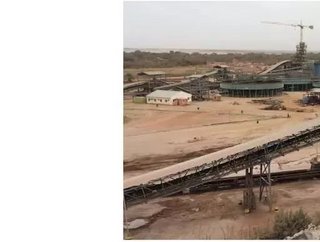Mali’s transitional government to review mining deals

Mali’s transitional government intends to review mining conventions signed with companies by the previous administrations, interim President Bah N’daw has confirmed, following recommendations from the country’s auditor general.
Mali is one of Africa’s largest gold producers, and companies operating in the country include Barrick Gold Corp, AngloGold Ashanti - which operates mines in Morila (pictured) and Sadiola - and Resolute Mining.
“The conventions establishing mining companies include clauses which do not always guarantee the protection of the interests of the state,” Auditor General Samba Alhamdou Baby says, after handing his report to the interim president, according to a report by Reuters.
“In particular the non-distribution of dividends, the non-payment of certain taxes, to which is added the existence of unjustified loans, all of which deprive the State of financial resources.”
He adds that a review of the conventions would better protect the interests of the state while respecting incentives for mining companies.
Mali’s parliament approved a new code in April 2020 that eliminates mining companies’ value added tax exemptions during production and shortens the period during which they are protected from fiscal changes to 20 years.
N’daw says that the recommendations were instructions to the interim administration, which he says would make the mining sector a priority during its 18-month term.
“I will assure you that everything will be done so that the state assumes its responsibilities and receives from the mining sector what is due to it,” N’daw states.
While the recommendations by the auditor general are intended to best protect the interest of the Malian people, their implementation risks increasing tensions with companies and creating a business climate that is not conducive to investment in the West African country.
Furthermore, any action in support of short-term changes to mining contracts would run counter to a new mining code adopted in 2019, which includes a 20-year stability term. This means that changes to fiscal or customs regimes included in the mining agreement can only be made two decades after their conclusion.
Mali exported 65.6 tons of gold in 2019 and remains one of Africa’s leading producers of the precious metal. The country is also home to major lithium reserves, a report from EcoFinAgency.com adds.
Mali’s transitional government was appointed earlier this month following the August 18 military coup that ousted the government of President Ibrahim Boubacar Keita.
Barrick and legacy company Randgold Resources have contributed $7.2 billion to the Malian economy in the form of taxes, royalties, salaries and payments to local suppliers during the last 25 years, the company states. Over the same period, its mines paid $2.7 billion in dividends, taxes and royalties to the state.
The Syama Underground Mine is owned by Société des Mines de Syama S.A. (SOMISY). Resolute has a 80 percent interest in SOMISY and the Government of Mali a 20 percent stake.
- Luca Mining's Tahuehueto to double throughputSupply Chain & Operations
- Galiano awards mining contract for Asanko Gold Mine in GhanaSupply Chain & Operations
- Peter Mah named President and CEO of Spanish Mountain GoldSupply Chain & Operations
- SSR Mining acquires 40% stake in Hod Maden from Lidya MinesSupply Chain & Operations






